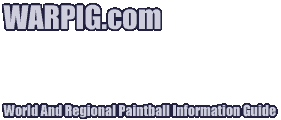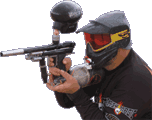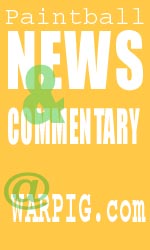  |
|
|
|
|
|
|
  |
|
|
|
|
|
|

Click HERE to read about the NPPL's 2001 organizational meeting.
|
by Bill Mills March 2002 In the early 1990s, a group of pro and
amateur team captains who were dissatisfied with the cost and quality of
tournaments produced by then top dog promoter Jim Lively decided to give
it a go on their
Through the 1990s and even through today, the NPPL tournament series has been the only tournament series in North America to allow professional teams to compete. In the late 90s the teams which made up the league became less and less involved in its operation. Eventually nearly everything regarding the league was done by the promoters, with only an appointed rules committee, a secretary and figurehead president remaining. In 1999 the NPPL corporation was dissolved by the State of New York for failing to file state tax returns. 2000 turned out to be a lackluster year for the NPPL in terms of event quality and player satisfaction. This led to a renewed interest in the idea of a player owned and controlled league. At a pre season negotiation meeting promoters of the NPPLs 5 annual events - most of whom had been founders of the original NPPL and all of whom are directly tied to at least 1 pro team each - met with players representing the league. The meeting had ups and downs. The promoters were concerned that after the league had dropped the ball, and they had built up the tournament series that one or more of them could be shut out by the league's new power structure. They cited a chart that then NPPL president Tom Cole had prepared from WARPIG.com's score archives showing that under their leadership the NPPL was showing a 20 percent annual growth rate in terms of attending teams. The league, on the other side of the table wanted sanctioning fees to be paid so that it could fund a corporate restructuring, and wanted the tournament promoters to have more accountability to the players. As a defensive strategy, the promoters announced, during the second day of negotiation that they had joined together to form Paintball Sports Promotions, Inc. The league could not then selectively dismiss one of the 5 promoters, they would deal with all of them or none of them. With that announcement, Cole gathered the league reps and left the bargaining table saying that the league/promoter relationship was through. Fortunately cooler heads prevailed and less than an hour later both groups met again and planned out the 2001 season. 2001 proved to be a rebirth year for the NPPL. The league was reincorporated under a new president, Chuck Hendsch. Prize distribution was now handled by player representatives, and the job quickly fell onto the lone shoulders of steering committee member Jeff Stein. With the promoters now working together instead of against one another, their pooled resources and knowledge led to a marked increase in the quality of the tournament sites. A prime example of this was the new $200,000 air fill system that greatly streamlined air fills but would have been too expensive for any one promoter to purchase separately. In 2002 the NPPL wanted to expand its role, providing professionally trained referees who did not participate in the series in order to reduce judging biases. The 2002 season started before negotiations were finalized, and then continued on into late March. by March 27 the situation had degraded to the point that Paintball Sports Promotions team liason Lane Wright announced via e-mail that they had split. Realistically, the effect on Paintball Sports Promotions is not expected to be immense. They will still produce the 5 tournament pro/am series for which they were well known - LA Open, Las Vegas Open, Chicago Open, Atlantic City Open and World Cup. Teams will still be ranked by how they compete in those tournaments over a season. The big difference is that the 5 tournaments won’t have the letters NPPL in front of their names. With the NPPL theoretically using new promoters to produce events PSP will be at odds with them in competing both for sponsor’s dollars and where teams will play. For the NPPL, the situation means much more change. According to NPPL President Chuck Hendsch in a telephone interview from Germany where he was preparing to play with Dynasty in the Max Masters, the league had not been asking for larger sanctioning fees for 2002 – one of the major points of contention was the choice of members of the league’s steering and rules committees. Hendsch said that the promoters had also asked for a 5 year exclusive contract. Hendsch seemed positive that though the split had been announced, it may not be permanent. Hendsch stated that the league was planning a counter-proposal to the promoters that should be completed by April third, “The problem with the contract they wanted us to sign is that it is all one sided,” said Hendsch. “A lot of sponsors have already told us that they will support the NPPL after a split. As much as I’d like to avoid a split we have to do what is best for the players.” Hendsch went on to state that he felt a one or two year event promotion contract was more reasonable, and that an exclusive contract would need to go both ways, so that if PSP wanted to be the only company that could produce NPPL events, they would have to agree not to produce any events that would compete with the NPPL. In a telephone interview with PSP’s Renick Miller, he cited concerns from the promoter’s side of the table which included the failure of the NPPL to hold to previous commitments. According to Miller PSP had offered, in their 2002 contract, to pay a reduced sanctioning fee per event, but more than make up for that cash reduction be covering a number of the league’s other costs. Specifically, airfare and hotel costs for the league’s steering committee and rules committee members, as well as relevant members of the press to attend the annual organizational meeting and negotiations between the league would be taken care of by PSP. Additionally, the contract offered free entry to NPPL tournaments for Jeff Stein’s team to pay him for the time he works on behalf of the league locating and organizing the prize package. Miller specifically had a problem with the impromptu decision in Los Angeles that allowed Dynasty, Avalanche and Ground Zero members who had practiced the SC Arenas fields to play in the LA Open after paying $2,000 fines to the league, while PSP was saddled with the cost of labor to change the fields. According to Miller, who took up much of the negotiation with Hendsch on behalf of Paintball Sports Promotions, the issue of exclusivity had only surfaced recently, and he had no problem with it going both ways, even up to the level of paying a sanctioning fee for the Mardi Gras Open and calling it an NPPL event, as that is a tournament recently acquired by Paintball Sports Promotions. Another issue for PSP was the player mailing list. In 2001, the promoters and the league had agreed that a player mailing list would be generated from player ID tags, and used to promote NPPL tournaments. According to Miller, the league has not been forthcoming with the list, despite assurances it would be used for only promoting the tournaments, even offering to pay fines if evidence was offered of its misuse. Miller summed the promoter’s viewpoint by saying that they had put a tremendous amount of money and time into building the NPPL name into something respectable and wanted to continue with it. Ultimately the players in the tournaments are their customers and their desires and needs must be understood by the promoters if they are to be successful, but in order for them to continue with the league, they would need to be protected with exclusivity, rather than fund an entity that would become their competitor. Miller stated that Paintball Sports Promotions is still very open to negotiating with the NPPL. For now, the NPPL and Paintball Sports Promotions are apart. As to if or when they will come back together remains to be seen. Editor's Note: In response to this article, Hendsch later commented that he supplied the requested mailing list to Paintball Sports Promotion staff on CD-ROM at the 2002 Mardi Gras Open. |
| Copyright © 1992-2019
Corinthian Media Services. WARPIG's webmasters can be reached through our feedback form. All articles and images are copyrighted and may not be redistributed without the written permission of their original creators and Corinthian Media Services. The WARPIG paintball page is a collection of information and pointers to sources from around the internet and other locations. As such, Corinthian Media Services makes no claims to the trustworthiness or reliability of said information. The information contained in, and referenced by WARPIG, should not be used as a substitute for safety information from trained professionals in the paintball industry. |